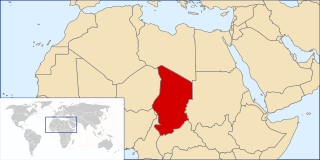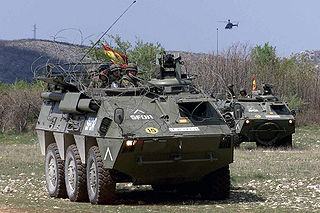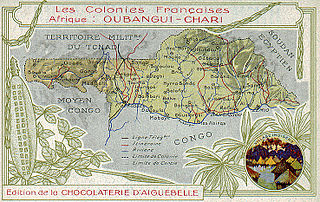
United Nations Security Council Resolution 688, adopted on 5 April 1991, after receiving letters from the representatives of France, Iran, and Turkey and expressing its concern over political repression of the Iraqi people, including those in Iraqi Kurdistan, the Council condemned the repression and demanded that Iraq, as a contribution to removing the threat to international peace and security, end the repression and respect the human rights of its population.

United Nations Security Council Resolution 1706, adopted on August 31, 2006, after recalling previous resolutions on the situation in Sudan, including resolutions 1556 (2004), 1564 (2005), 1574 (2004), 1590 (2004), 1591 (2005), 1593 (2004), 1663 (2006), 1665 (2006) and 1679 (2006), the Council expanded the mandate of the United Nations Mission in the Sudan (UNMIS) to include deployments in Darfur to enforce the Darfur Peace Agreement.

The United Nations Mission in the Central African Republic and Chad (MINURCAT) was a United Nations peacekeeping mission established by the United Nations Security Council on September 25, 2007 to provide a multidimensional presence of up to 350 police and military personnel to eastern Chad and north-eastern Central African Republic
UN Security Council Resolution 1834 was adopted unanimously by the 15 member states of the United Nations Security Council, extending the United Nations mission in Chad and the Central African Republic (MINURCAT) until March 15, 2009, which was due to expire on September 25, 2008.
Détachement Intégré de Sécurité (DIS) is a United Nations supported Security force in Chad, responsible for securing Internally Displaced Person (IDP) sites and nearby towns in Eastern Chad.

United Nations Security Council resolution 504, adopted on 30 April 1982, after receiving representations from the Organisation of African Unity (OAU) and Chad, noting the cooperation between the United Nations and OAU, the Council took note of the OAU's decision to establish a peacekeeping force in Chad due to the civil war there.

United Nations Security Council Resolution 1913, adopted unanimously on March 12, 2010, after recalling resolutions 1769 (2007), 1778 (2007), 1834 (2008) and 1861 (2009), the Council noted that the situation in the region of Darfur, Sudan and Chad and the Central African Republic constituted a threat to international peace and security, and therefore extended the mandate of the United Nations Mission in the Central African Republic and Chad (MINURCAT) for a further two months, until May 15, 2010.

United Nations Security Council resolution 910, adopted unanimously on 14 April 1994, after considering a letter by the UN Secretary-General Boutros Boutros-Ghali advising of his intention to send a reconnaissance team to the Aouzou Strip disputed between Chad and Libya, the Council decided to exempt the reconnaissance mission from a provision in Resolution 748 (1992) that imposed international sanctions on Libya.

United Nations Security Council resolution 915 was adopted unanimously on 4 May 1994. While reaffirming Resolution 910 (1994), the Council, acting on a recommendation by the UN Secretary-General Boutros Boutros-Ghali, established the United Nations Aouzou Strip Observer Group (UNASOG) to supervise the withdrawal of Libyan forces from the Aouzou Strip following an International Court of Justice opinion rendered in the Libya–Chad Territorial Dispute case that the strip formed part of the territory of Chad.

United Nations Security Council resolution 926, adopted unanimously on 13 June 1994, after reaffirming Resolution 915 (1994), the Council commended the work of the United Nations Aouzou Strip Observer Group (UNASOG) and the co-operation of Libya and Chad and decided, with immediate effect, to terminate the UNASOG mission in the Aouzou Strip.

United Nations Security Council resolution 1088, adopted unanimously on 12 December 1996, after recalling all resolutions on the conflicts in the former Yugoslavia and in particular resolutions 1031 (1995) and 1035 (1995), the council, acting under Chapter VII of the United Nations Charter, authorised the creation of the Stabilisation Force (SFOR) in Bosnia and Herzegovina to replace the Implementation Force (IFOR).

United Nations Security Council resolution 1125, adopted unanimously on 6 August 1997, after expressing concern at the situation facing the Central African Republic, the Council authorised the continuation of the Inter-African Mission to Monitor the Implementation of the Bangui Agreements (MISAB) mission in the country for a further three months.
United Nations Security Council Resolution 1922, adopted unanimously on May 12, 2010, after recalling resolutions 1769 (2007), 1778 (2007), 1834 (2008), 1861 (2009) and 1913 (2010), the Council noted that the situation in the region of Darfur in Sudan, Chad and the Central African Republic constituted a threat to international peace and security, and therefore extended the mandate of the United Nations Mission in the Central African Republic and Chad (MINURCAT) for a further two weeks until May 26, 2010, pending further discussions on its future.

United Nations Security Council Resolution 1923 was adopted unanimously on 25 May 2010, after recalling resolutions 1769 (2007), 1778 (2007), 1834 (2008), 1861 (2009), 1913 (2010) and 1922 (2010). The Council extended the mandate of the United Nations Mission in the Central African Republic and Chad (MINURCAT) for a final time until 31 December 2010, with a complete withdrawal by that date.
United Nations Security Council Resolution 1935, adopted unanimously on July 30, 2010, after reaffirming all previous resolutions and statements on the situation in Sudan, the Council extended the mandate of the African Union – United Nations Hybrid Operation in Darfur (UNAMID) for a further 12 months until July 31, 2011 and demanded an end to fighting and attacks on United Nations personnel and civilians.

United Nations Security Council resolution 1477, adopted unanimously on 29 April 2003, after recalling resolutions 955 (1994), 1165 (1998), 1329 (2000), 1411 (2002) and 1431 (2002), the Council forwarded a list of nominees for permanent judges at the International Criminal Tribunal for Rwanda (ICTR) to the General Assembly for consideration.
United Nations Security Council Resolution 1778 was unanimously adopted on 25 September 2007.
United Nations Security Council Resolution 1861 was unanimously adopted on 14 January 2009.

The Bangui Agreements are a 1997 negotiated peace accord in the Central African Republic (CAR). The accord was drawn up in Bangui to bring an end to the 1990s conflict between government and rebel forces. It was signed by the Patassé government, opposition parties and religious groups. The agreement envisaged several steps to sort out the views of various political factions, reorganize the defense establishment, and implement reforms in the country to improve its economy.

The United Nations Mission in the Central African Republic, more commonly known as MINURCA was a United Nations peacekeeping force in the Central African Republic. The 1350-troop mission was established by the United Nations Security Council Resolution 1159 in March 1998. It was replaced in 2000 after the Central African Republic conducted two peaceful elections, with the entirely civilian composed UN Peace-Building Support Office in the Central African Republic (BONUCA).










